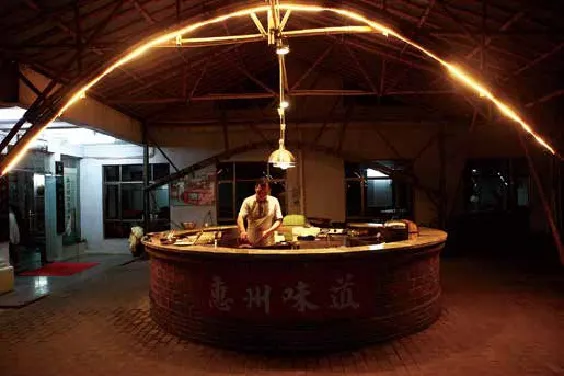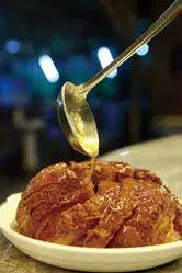原味为王
原味为王
The best dishes do not rely on condiments, but are works that stem from the very soul of the chef. The unique cuisine of Huizhou is prepared with quality ingredients and craftsmanship, where any tiny deviation would result in overly strong or bland fl avours.
真正的美食不靠佐料,而是用心来调和。鲜美的食材,加上多一分太浓、少一分太淡的匠人之心,炮制出非同寻常的惠州美食。
Gao Yanlai, a native of Huizhou, has built an open, circular stove with square furnishings outside his establishment. The stove is decorated with 4 big characters: Huizhou Weidao (the fl avours of Huizhou).
What are the fl avours of Huizhou exactly? Gao believes that Huizhou fl avours focus primarily on“original textures and tastes”. Gao had attended the CCTV television culinary show titled Zhongguo Weidao (Flavours of China). The director had repeatedly asked Gao what condiments to prepare before the show. Gao's answer came quite surprising to everyone: “I don't use condiments.”
Gao believes that too much additional fl avouring would spoil the original tastes and fl avours of the food. “Fresh ingredients, harmonious combination of fl avours, and sincerity. That's what it takes to create wonderful food.”
Yanjuji (salt baked chicken) is one of the most popular dishes offered at Gao Yanlai's establishment. Unlike the Yanjuji offered in the market that come with artif i cial fl avourings, Gao insisted upon using the traditional and ancient method of “rubbing the chicken with coarse sea salts and baking over a small fi re”. The coarse sea salts would be stir fried over strong fi re for 20 minutes to purge any water content. Grass paper would then be used to cover a Sanhuangji (3-yellow chicken, a Chinese breed of chicken with yellow feathers, claws, and beaks) that has been wellrubbed down using shajiang (galangal) powder and salt. The chicken is then baked over a small fi re for 45 minutes.
Gao invested such efforts to ensure that his guests are provided with the most natural and unadulterated fl avours.
Huizhou is the home of Meicai in China (dry, pickled mustard). To bring out the best fl avours of Meicai, the natives of Huizhou would steam, braise, cook, and stew the pickle. Gao also has a preferential love for Meicai and is capable of preparing a dozen dishes with it. Meicai Kourou (steamed pork belly with pickled mustard) is a well-known dish that features the pickle.
It was said that the famous Song Dynasty poet and statesman Su Dongpo sent chefs to acquire the art of preparing the famous Xihu (in Hangzhou) dish of Dongpo Kourou (Dongpo's steamed pork belly). The result was the equally famous and wholesome Meicai Kourou. What exactly are the properties of classical Meicai Kourou? Gao Yanlai believes that the perfect rendition of this dish must feature the sweetness of the Meicai pickle as well as the aromas of steamed pork. Most importantly, these 2 fl avours must be mutually integrated yet remain distinct.
“Many chefs working in hotels would add Chu Hou Paste, Hoisin Sauce or other strongly fl avoured condiments to improve the aroma. However, this act would destroy the distinctive fl avours of Meicai and the pork belly. I would advise against it.”
Xunliao Bay is located at the other end of Huizhou.
Here, Zheng Liwen is pursuing a similar culinary approach of preserving the natural tastes and fl avours of the ingredients. Zheng has mastered the art of steaming. A dozen local seafood's such as mantis shrimps, scallops, tiger prawns, and crabs are brought together and steamed within a single pot. Steaming is the perfect method for preserving the refreshing fl avour of seafood.
Niangchun is a rare and disappearing folk dish in Huizhou, and is considered the most diff i cult stuffed delight in the area.
In the local dialect, the word “chun” refers to eggs. Niangchun can therefore be literally translated as stuffed eggs. Pork, prawns, and scallions are minced and carefully stuffed within the yolk of a duck egg. The entire setup is then carefully cooked over a small fi re.
In ages past, Niangchun would be prepared for children on their birthdays. Locals believe that eating eggs would help purge ill omens and calamities, and represented the love and expectations that parents and elders have for children. Food was not very abundant during Gao's childhood. A Niangchun for their birthday was enough to send children prancing with delight. Gao thus regards Niangchun as the taste of childhood.
Amajiao (grandma's calling) is another snack that could send Gao reminiscing about his childhood. Amajiao is a traditional fried snack that was once sold along the streets of Huizhou. Vendors would heat frying oil at the street corner while preparing a mixture of shredded turnip, dried shrimp, chopped pork, and condiments, that is held together by starch paste and shaped to resemble a small-bowl before frying them to create these wonderful delights.
As Amajiao vendors prepared these fried snacks, they would often fi nd themselves immediately swarmed by children eager for a bite yet lacking the coins to pay for them. Vendors, hoping to get customers capable of paying him for his work, would tell the children: “Ama Jiao ni huijia la”(your grandma is calling you home). This was how Amajiao got its name.


1.Stuffed Tofu酿豆腐

2.Niang Chun (Stuffed eggs)酿春

3.Meicai Kourou(Steamed pork belly with pickled mustard)梅菜扣肉
惠州人高燕来在自家吃食店里砌起一座外圆内方的露天灶台,灶台前方书四个大字:惠州味道。
惠州味道到底是何滋味?高燕来认为惠州味道就是“原汁原味”。参加央视《中国味道》节目录制,编导几次询问高燕来佐料有哪些,高燕来的回答令人咂舌:不用佐料。
他认为,佐料过多会掩盖食物本身的味道。“只要食材新鲜,味道搭配调和得当,加上用心,就能做出好东西。”
盐焗鸡是高燕来吃食店里的招牌菜,与市面上用化学香料调制的盐焗鸡不同,高燕来仍沿用传统“粗拉海盐小火慢焗”的古法制作。20分钟将海盐的水分炒干,然后用草纸将用沙姜粉、盐腌制过的三黄鸡包裹起来,小火慢焗45分钟。
如此费尽心力,高燕来就是希望能够品尝到食材的原汁原味。
惠州是“中国梅菜之乡”。惠州人用蒸、焖、煮、煲等烹饪技法,将梅菜的滋味发挥到极致。高燕来同样偏爱梅菜,他用梅菜能做出十多道美食,梅菜扣肉是其拿手好菜。
梅菜扣肉相传是苏东坡派人仿杭州西湖的东坡扣肉,结合惠州特产梅菜烹制的一道佳肴。怎样算是经典的梅菜扣肉呢?高燕来认为,既要能吃出梅菜的清甜,又要能品出肉的香味,两种味道互有融合,却又不完全混为一味。
“很多饭店的厨师做这道菜,加入柱侯酱、海鲜酱等味道浓厚的酱料来提升香味,反而破坏了梅菜和肉各自的独立性,不可取。”
在惠州另一端的巽寮湾,郑力文有着相似的烹饪理念,他同样追求食材的原汁原味。他用蒸的方法,将当地盛产的濑尿虾、扇贝、对虾、螃蟹等10种海鲜烩于一锅。蒸,这种烹饪方法恰恰能最大限度地体现海鲜的鲜。
在惠州民间,还有一道几乎失传的菜品——酿春,这是惠州最难的一道酿菜。
惠州话中的“春”就是蛋,酿春其实是酿蛋:将剁碎的猪肉、虾肉和葱花小心塞入生鸭蛋的蛋黄中,用小火慢慢养熟。
酿春本是旧时孩子生日时加的一道菜,当地人相信吃个蛋便可脱个难,酿春寄予着父母长辈对孩子的期望。高燕来幼时物质匮乏,生日有酿春,足以让孩子们手舞足蹈,所以他一直认为酿春是童年的味道。
另一道让高燕来怀念童年味道的小吃是阿嫲叫。阿嫲妈叫是惠州传统的油炸类风味小吃,旧时小贩在街头巷尾支起油锅,将白萝卜丝、虾米、肉粒混合调好味料的面粉浆,放入油锅慢火煎炸,呈小碗状,喷香可口。
通常煎炸阿嫲叫的小贩一现身,身边立刻围上一圈嘴馋却又没钱买的孩子。小贩怕影响生意,便哄孩子说,你阿嫲叫你回家啦。阿嫲叫由此得名。
LESS IS MORE
Text by Ge Rufeng Photos by Zeng Jian

